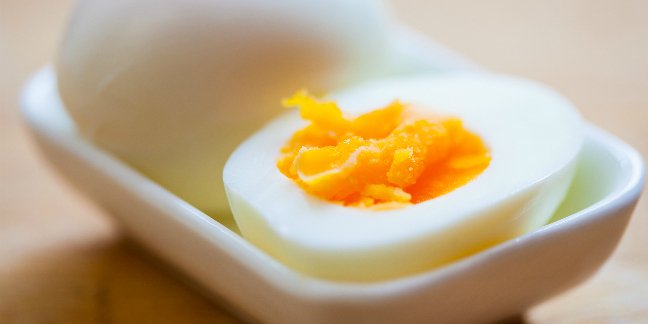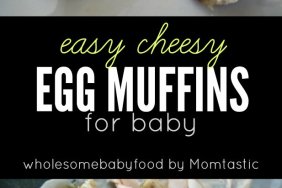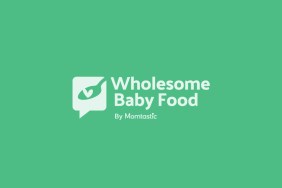Image: Shutterstock
When can I feed my baby eggs? Do babies have to wait to eat eggs to avoid an allergy?
Eggs are in the top 8 of all allergens but recommendations for introducing eggs to babies have been changing. It is the white of the egg that is allergenic and not the yolk.
A 2008 study, and many studies done after, indicated that waiting to introduce eggs to your baby may not prevent any atopic (i.e. ezcema) disease(s). Many are now suggesting that babies may be introduced to whole eggs from the start (for those with no known history of food allergies and/or egg allergies). Read more below!
Many pediatricians say that introducing egg yolks are typically fine for <the non-allergic> baby around 8 months old; this recommendation is changing however with many doctors suggesting that egg yolks, and the whole egg, make a great first food.
Portions of the Egg that are Allergenic
The yolk of an egg does not contain the proteins that cause an allergy to eggs. It is very rare for anyone to be allergic to the yolk of an egg. The egg whites on the other hand, contain 4 proteins that can range from mildly to highly allergenic.
Most pediatricians say that egg whites/whole eggs should not be fed to baby before 1 year of age however recommendations are changing.
![]() Recommendations for introducing eggs to baby are changing! A 2008 study, and many studies done after, indicated that waiting to introduce eggs to your baby may not prevent any atopic (i.e. ezcema) disease(s). Many are now suggesting that babies may be introduced to whole eggs from the start (for those with no known history of food allergies and/or egg allergies).
Recommendations for introducing eggs to baby are changing! A 2008 study, and many studies done after, indicated that waiting to introduce eggs to your baby may not prevent any atopic (i.e. ezcema) disease(s). Many are now suggesting that babies may be introduced to whole eggs from the start (for those with no known history of food allergies and/or egg allergies).
“Although solid foods should not be introduced before 4 to 6 months of age, there is no current convincing evidence that delaying their introduction beyond this period has a significant protective effect on the development of atopic disease regardless of whether infants are fed cow milk protein formula or human milk. This includes delaying the introduction of foods that are considered to be highly allergic, such as fish, eggs, and foods containing peanut protein.” Click to view report
A recent interview with Dr. Greer in Medscape Pediatrics notes that “Now we can tell mothers: If you have exclusively breastfed for 4 months and your child is not at risk for allergy, you can introduce any food at 6 or 8 months or whatever.”
Australian Study (2010) finds infants given egg after 12 months of age are up to five times more likely to develop allergies compared to those who are introduced to eggs at four to six months, depending on how the egg is cooked.
Please be sure to discuss the introduction of potential allergenic foods with your pediatrician!
Many studies that have been done on infants who have egg allergies find that by the time the infant has reached age 5, the allergy has been outgrown. This is good news as the egg is highly nutritious and an important part of ones diet.
What is an egg allergy?
As in the process of any allergic reaction, an egg allergy occurs when the body mistakes an egg protein as a harmful invader. The body reacts by releasing antibodies called immunoglobulin E(IgE). The IgE in turn prompts the body to release chemicals known as histamines. When the histamines are released, the body reacts by producing symptoms such as runny nose, itchy eyes, a skin rash and in severe cases, anaphylaxis.
Diagnosing an egg allergy in an infant is really hit or miss and that is why it is very important to follow the 4 Day Wait Rule when introducing your baby to new foods. If you feel that your baby may have an egg allergy, you may want to begin an Allergy Elimination Diet to determine if the suspect is indeed an egg.
There are 4 proteins that are allergens in eggs
A hen’s egg white contains 4 proteins that are potential allergens:
- ovomucoid
- ovalbumin
- ovotransfferin and
- lysozyme
It is the protein ovalbumin, which is the major allergen and it makes up fifty percent of an egg white.
The yolk of a hen’s egg also contains proteins however these proteins are seldom allergens. The proteins are:
- apovitellenins I
- apovitellenins VI
- phosvitin
When should I feed my baby egg yolks?
As mentioned, egg yolk allergy is very rare and many medical resources are now recommending egg yolk as a great first food for babies. If your family has a history of egg allergies, then it is best to wait until after 12 months old to introduce egg yolks even if recommendations for introducing eggs are changing.. There are ways of preparing egg yolks so that the white is not eaten however it is possible that some of the egg white protein may still be on the yolk itself.
Can my baby eat baked goods with whole eggs in them?
Many pediatricians will say that using a whole egg in a baked good recipe (for the non-allergic baby/child) is fine for the infant who is between 8-9 months old.
If your baby has had any reactions to foods that you are sure of, it is probably best to use a substitute for eggs in the recipes.
If you find that your baby is allergic to eggs, you may want to take note of all the other names for egg products that are used as ingredients in many foods:
EGG FREE DIET
Avoid foods that contain any of the following:
- albumin
- egg (white, yolk, dried, powdered, solids)
- egg substitutes
- eggnog
- globulin
- lysozyme (used in Europe)
- mayonnaise
- meringue
- ovalbumin
- ovomucin
- ovomucoid
- ovovitellin
- Simpleese
Note: A shiny glaze or yellow glaze on baked goods usually indicates the presence of egg.
Egg Substitutes for both leavening and binding agents:
You may use the following as a leavening agent to replace eggs in any baked good recipe:
- 2 tablespoons carbonated water and 2 teaspoons baking flour
- 1 teaspoon baking powder, 1 tablespoon water, and 1 tablespoon vinegar (add vinegar separately at the end for rising)
- Dissolve 1 teaspoon yeast in 1/4 cup warm water
- 1 heaping tablespoon of soy flour and one tablespoon water
- 1 tablespoon bean flour and 1 tablespoon oil
- 1 tablespoon of arrowroot powder mixed with 3 tablespoons water
- 1 tablespoon cornstarch mixed with 3 tablespoons water
- 2 tablespoons gluten flour or unbleached white flour, 1 1/2 teaspoons corn oil, 1/2 teaspoons baking powder, and 2 tablespoons water
You may substitute the following as binders in a baked good recipe
- 1/2 large mashed banana
- 1/4 cup apple sauce or pureed prunes
- 1 tablespoon ground flaxseed mixed with 3 tablespoons water
- 1 1/2 tablespoons water, 1 1/2 tablespoons oil, and 1 teaspoon baking powder
- Combine one packet of unflavored gelatin with one cup boiling water – 3 tablespoons of this mixture equal one egg
- 1 tablespoon apricot puree
- 1/4 cup of soft tofu
- 1/4 cup soy milk
![]() Remember, always consult with your pediatrician regarding introducing solid foods to your baby and specifically discuss any foods that may pose allergy risks for your baby.
Remember, always consult with your pediatrician regarding introducing solid foods to your baby and specifically discuss any foods that may pose allergy risks for your baby.
Do Vaccines Contain Egg Proteins?
You should note that many of today’s vaccinations are now suspended in egg white protein as a preservative. Ordinarily, persons who are able to eat eggs or egg products safely can receive these vaccines. The MMR (measles, mumps and rubella) vaccine does not contain a large amount of the egg white protein and a reaction is unlikely to occur in those with egg allergies.
In fact, many MMR vaccines produced today do not contain any egg protein at all. The Flu shot and Yellow Fever vaccine however do contain egg protein and those with egg allergies should not receive the Flu shot or the Yellow Fever vaccine. Click Here for a list of all vaccines and their ingredients (U.S.).
What are some symptoms of an egg allergy
- Allergic rhinitis
- Asthma
- Dermatitis
- Diarrhea
- Gastrointestinal symptoms
- Hives
- Nausea
- Oral allergy syndrome (symptoms appear around the mouth, lips and throat)
- Vomiting
- Wheezing
- Anaphylaxis



